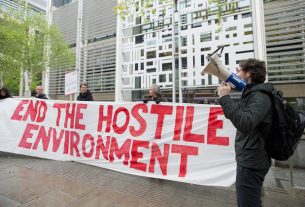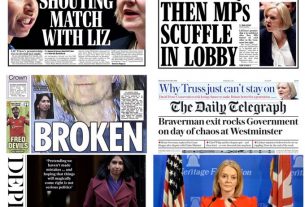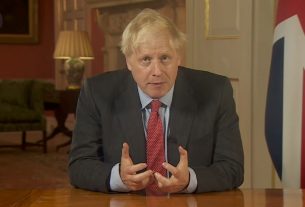The highly critical National Audit Office report into the government’s awarding of £18 billion in procurement deals has been overshadowed by infighting in the Labour party and the prime minister’s green plan for the UK.
The parliamentary watchdog made a number of startling findings including a lack of transparency, failures to explain why certain suppliers were awarded contracts and the existence of a “high priority” channel for PPE suppliers with political connections.
Accusations of cronyism will be bolstered by the NAO report given some 500 “suppliers” with political links in the “high priority” channel saw their pitches for contracts – in some instances worth hundreds of millions of pounds – “automatically treated as credible” by officials “charged with procuring PPE”, reports the Guardian.
Politically connected suppliers have 10x-times better chance of securing contracts
Politicians and senior officials referred 493 suppliers to the scheme but the details of who the referring individual was, is known for less than half of the contracts awarded.
Less than half of the £18bn was subject to a competitive tender and “high priority” status gave politically connected suppliers a ten-times better chance of winning contracts than suppliers without such contacts.
The Department of Health and Social Care (DHSC) accounted for 90% of the contracts awarded up to August.
Business secretary Alok Sharma said the NAO’s report “acknowledged that we had to do things at a great deal of pace” adding the “key pressure was to get PPE. We had to do an enormous amount, work very fast to secure the PPE and that’s what we did.”
The NAO report states “we cannot give assurance that government has adequately mitigated the increased risks arising from emergency procurement or applied appropriate commercial practices in all cases. While we recognise that these were exceptional circumstances, there are standards that the public sector will always need to apply if it is to maintain public trust.”
Starmer v Corbyn is splitting Labour
The government will be grateful that Labour party infighting has taken a lot of the media’s focus away from the damming NAO report.
A “civil war” in the party was predicted when Keir Starmer suspended Jeremy Corbyn from the party less than three weeks ago. Last night Corbyn’s suspension was lifted but Starmer reacted almost immediately by withdrawing the party whip from Corbyn, plunging Labour into turmoil.
Corbyn was readmitted to the Labour party last night following his suspension last month for claiming antisemitism in the party had been “dramatically overstated for political reasons”.
That claim came immediately after publication of a report into antisemitism in Labour by the Equality and Human Rights Commission (EHRC) found the party acted unlawfully by failing to prevent “acts of harassment and discrimination” against Jewish members.
Starmer suspended his predecessor from the party, but last night, 19 days later, Corbyn’s suspension was unanimously lifted by the party’s National Executive Committee (NEC) after the former leader said he believed complaints about antisemitism in the Labour party were “neither exaggerated nor overstated”.
While Corbyn’s supporters celebrated his opponents were outraged. Starmer did not hesitate to act and withdrew the whip from the same MP who was campaigning to be prime minister just 12 months ago.
Starmers actions have “sparked a furious backlash from Labour leftwingers”, the Guardian reports, and elsewhere states the leader faces a revolt after 27 Labour MPs condemned his decision to isolate Corbyn.
“The decision to not restore the whip to Jeremy Corbyn is wrong,” tweeted the Socialist Campaign Group of Labour MPs, adding: “It should be swiftly reversed.”
PM’s 10-point green plan for UK
Leadership issues are nothing new to Boris Johnson who has announced his “10-point green plan” for the UK to hit net zero emissions by 2050 – including the headline grabbing ban on the sale of new diesel and petrol cars by 2030.
The Telegraph suggests the 10-point green plan is an attempt “to reset his premiership” following the exit of Dominic Cummings from Downing Street.
The long awaited plan for a “green industrial revolution” promises the UK’s first town to be powered by hydrogen, new nuclear reactors and carbon capture “clusters” to suck carbon dioxide from the atmosphere.
Also included is a directive for all new homes built from 2023 – gas boilers will be banned so new builds will need to be super-insulated. Heat pumps will replace gas boilers and the government wants 600,000 to be installed in existing homes by 2028.
PM’s £12b is actually £4bn
The PM today claimed that £12bn will be spent on the 10-point plan however when challenged about the number, business secretary Sharma admitted: “Around £4bn of this is new money – the other money is money that has been pledged previously or, indeed, at the last Budget.”
Green MP Caroline Lucas was among critics welcoming the intent but questioning the government’s commitment to properly addressing the climate issue given the paltry amounts it is willing to spend. Lucas told BBC news more resources are needed and pointed out the £4 billion of new funding to implement the PM’s plan is but a fraction of the £27 billion to be spent on road building.
It also represents less than 4% of the money that will be spent on the HS2 rail upgrade – and just under a fifth of the £18bn spent by the government since March on questionable Covid contracts.




